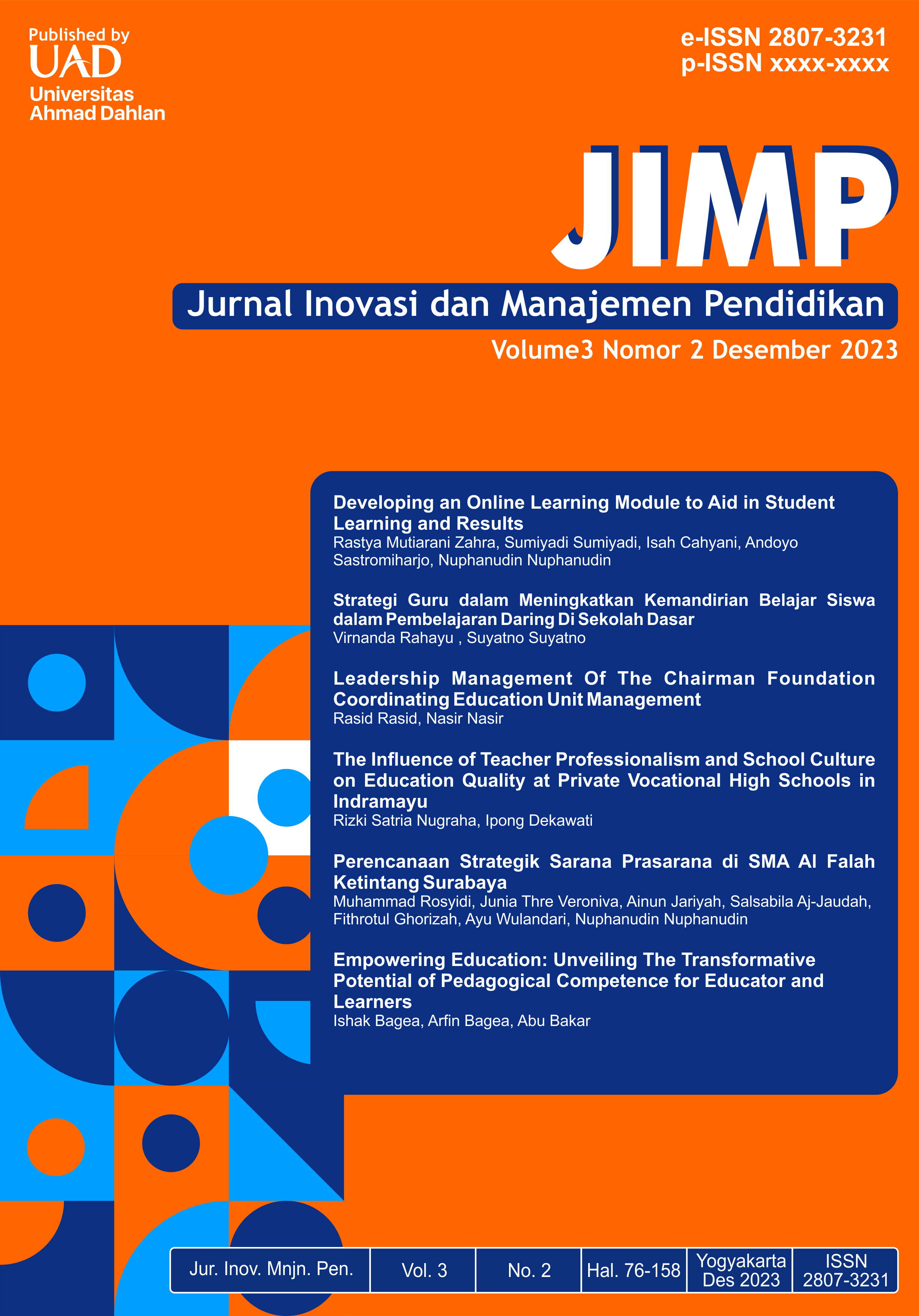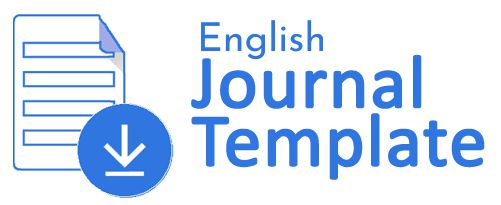Empowering Education: Unveiling The Transformative Potential of Pedagogical Competence for Educator and Learners
DOI:
https://doi.org/10.12928/jimp.v3i2.9371Keywords:
Educator, Empowering, Learners, PendagogicalAbstract
Paper writing aims to explain the empowering education unveiling the transformative potential of pedagogical competence for educator and learners. Pedagogics is a science that discusses education, namely the science of children's education. So pedagogic explains the ins and outs of children's education, pedagogic is a theory of children's education. Pedagogics as a science is needed by teachers. The task of the teacher is not only to teach to convey or transform knowledge to students at school, but the teacher has the task of developing the personality of his students in an integrated manner.
The teacher develops the child's mental attitude, develops the child's conscience or the child's heart so that the child will be sensitive to humanitarian issues, human dignity, as well as the teacher only develops children's skills, life skills in society so that he is able to face all the problems of his life.
Conclusion in writing papers: pedagogy competence is a set of knowledge, skills, and behaviors that must be possessed, lived and mastered by teachers or lecturers in carrying out professional duties.
This type of research uses qualitative research by means of researchers conducting observations, interviews and documentation with key informants and supporting informants, namely, teachers and students at the Muhammadiyah Kendari Private High School, and the novelty of the results of this research will be useful for the development of science, especially related educational sciences. how teachers and lecturers must master pedagogical competence, social competence, personality competence and social competence.
Conclusion: pedagogical competence has a central role in shaping quality and relevant education. The transformative potential of pedagogical competence not only enriches students' learning experiences, but is also the key to the sustainability and success of the education system in the future. Therefore, continuous efforts in developing and strengthening pedagogical competence need to be implemented as a long-term investment to improve the quality of education.
References
Abnisa, A. P., & Zubairi, Z. (2022). Personality Competence Educator and Students Interest in Learning. Scaffolding: Jurnal Pendidikan Islam Dan Multikulturalisme, 4(1), 279–290.
Antera, S. (2021). Professional competence of vocational teachers: A conceptual review. Vocations and Learning, 14(3), 459–479.
Apriana, D., Kristiawan, M., & Wardiah, D. (2019). Headmaster’s competency in preparing vocational school students for entrepreneurship. International Journal of Scientific & Technology Research, 8(8), 1316–1330.
Bülent, A., & Güven, M. (2022). Determining generic teacher competencies: A measurable and observable teacher competency framework. International Journal of Psychology and Educational Studies, 9(2), 308–331.
Chukwunemerem, O. P. (2023). Lessons from Self-Directed Learning Activities and Helping University Students Think Critically. Journal of Education and Learning, 12(2), 79–87.
Dörnyei, Z., & Ushioda, E. (2021). Teaching and researching motivation.
Giroux, H. A. (2020). On critical pedagogy.
Gkonou, C., & Mercer, S. (2017). Understanding emotional and social intelligence among English language teachers.
Grande, V. (2018). Lost for words! defining the language around role models in engineering education. 2018 IEEE Frontiers in Education Conference (FIE), 1–9.
Hanuscin, D. L., Lee, M. H., & Akerson, V. L. (2011). Elementary teachers’ pedagogical content knowledge for teaching the nature of science. Science Education, 95(1), 145–167.
KIARIE, N. P. (2021). AN EXAMINATION OF KENYA’S FIGHT AGAINST CORRUPTION AND TRIBALISM THROUGH EDUCATION WITH REFERENCE TO FREIRE’S CONCEPT OF EDUCATION FOR LIBERATION. SCHOOL OF EDUCATION IN PARTIAL FULFILMENT OF THE REQUIREMENTS FOR THE AWARD ….
Leggett, N. (2017). Early childhood creativity: Challenging educators in their role to intentionally develop creative thinking in children. Early Childhood Education Journal, 45(6), 845–853.
Masbur, M. (2022). A Spiritual Pedagogic Approach to Learning (Analytical Study of Approach Model). Jurnal Ilmiah Peuradeun, 10(2), 353–370.
Mehrabian, A. (2017). Communication without words. In Communication theory (pp. 193–200). Routledge.
Mindani, M., Satrisno, H., & Asvio, N. (2022). Pedagogic competence of teachers in religious moderation-based islamic education for disabled students.
Muhammdiah, M. ud, Hamsiah, A., Muzakki, A., Nuramila, N., & Fauzi, Z. A. (2022). The Role of the Professional Teacher as the Agent of Change for Students. Al-Ishlah: Jurnal Pendidikan, 14(4), 6887–6896.
Murkatik, K., Harapan, E., & Wardiah, D. (2020). The influence of professional and pedagogic competence on teacher’s performance. Journal of Social Work and Science Education, 1(1), 58–69.
Murphy, P. (2003). Defining pedagogy. In Equity in the classroom (pp. 17–30). Routledge.
Nurliana, M., & Sudaryana, B. (2020). The influence of competence, learning methods, infrastructure facilities on graduate quality (case study (vocational high school) smkn 5 bandung indonesia). Indonesian Journal of Social Research (IJSR), 2(1), 18–43.
Papamitsiou, Z., Filippakis, M. E., Poulou, M., Sampson, D., Ifenthaler, D., & Giannakos, M. (2021). Towards an educational data literacy framework: enhancing the profiles of instructional designers and e-tutors of online and blended courses with new competences. Smart Learning Environments, 8(1), 1–26.
Qobilovna, A. M. (2023). COMMUNICATIVE COMPETENCE AS A FACTOR OF TEACHER’S PROFESSIONAL COMPETENCY. American Journal Of Social Sciences And Humanity Research, 3(09), 32–44.
Simamora, R. M., De Fretes, D., Purba, E. D., & Pasaribu, D. (2020). Practices, challenges, and prospects of online learning during Covid-19 pandemic in higher education: Lecturer perspectives. Studies in Learning and Teaching, 1(3), 185–208.
Sudargini, Y., & Purwanto, A. (2020). The effect of teachers pedagogic competency on the learning outcomes of students. Journal of Industrial Engineering & Management Research, 1(4), 1–8.
Syakur, A., Junining, E., & Sabat, Y. (2020). The implementation of project based learning (PBL) model towards the result student’s TOEFL in 7th semester of Brawijaya University. Journal of Development Research, 4(1), 41–46.
Williams, R. (2022). A Qualitative Study of Critical Consciousness: How Black Leaders Perceive Their Roles in the Sociopolitical Development of Their Students. The University of Memphis.
Downloads
Published
How to Cite
Issue
Section
License
Copyright (c) 2023 Ishak Bagea, Arfin Bagea, Abu Bakar

This work is licensed under a Creative Commons Attribution-ShareAlike 4.0 International License.
This article's copyright is transferred to Universitas Ahmad Dahlan (UAD) if and when the item is accepted for publication. The undersigned hereby transfers any rights in and to the paper including without limitation all copyrights to UAD. The undersigned hereby represents and warrants that the article is original and that he/she is the author of the paper, except for material identified as to its source, with permission notices from the copyright owners where required. The undersigned represents that he/she has the power and authority to make and execute this assignment.
We declare that:
This paper has not been published in the same form elsewhere.
It will not be submitted anywhere else for publication before acceptance/rejection by this Journal.
Copyright permission is obtained for materials published elsewhere and which require this permission for reproduction.
Furthermore, I/We hereby transfer the unlimited rights of publication of the above-mentioned paper in whole to UAD. The copyright transfer covers the exclusive right to reproduce and distribute the article, including reprints, translations, photographic reproductions, microform, electronic form (offline, online), or any other reproductions of similar nature.
The corresponding author signs for and accepts responsibility for releasing this material on behalf of any co-authors. This agreement is to be signed by at least one of the authors who have obtained the co-author(s) assent where applicable. After submission of this agreement signed by the corresponding author, changes of authorship or in the order of the authors listed will not be accepted.
Retained Rights/Terms and Conditions
Authors retain all proprietary rights in any process, procedure, or article of manufacture described in the Work.
Authors may reproduce or authorize others to reproduce the Work or derivative works for the author's personal use or company use, provided that the source and the UAD copyright notice are indicated, the copies are not used in any way that implies UAD endorsement of a product or service of any employer, and the documents themselves are not offered for sale.
Although authors are permitted to re-use all or portions of the Work in other works, this does not include granting third-party requests for reprinting, republishing, or different types of re-use.







